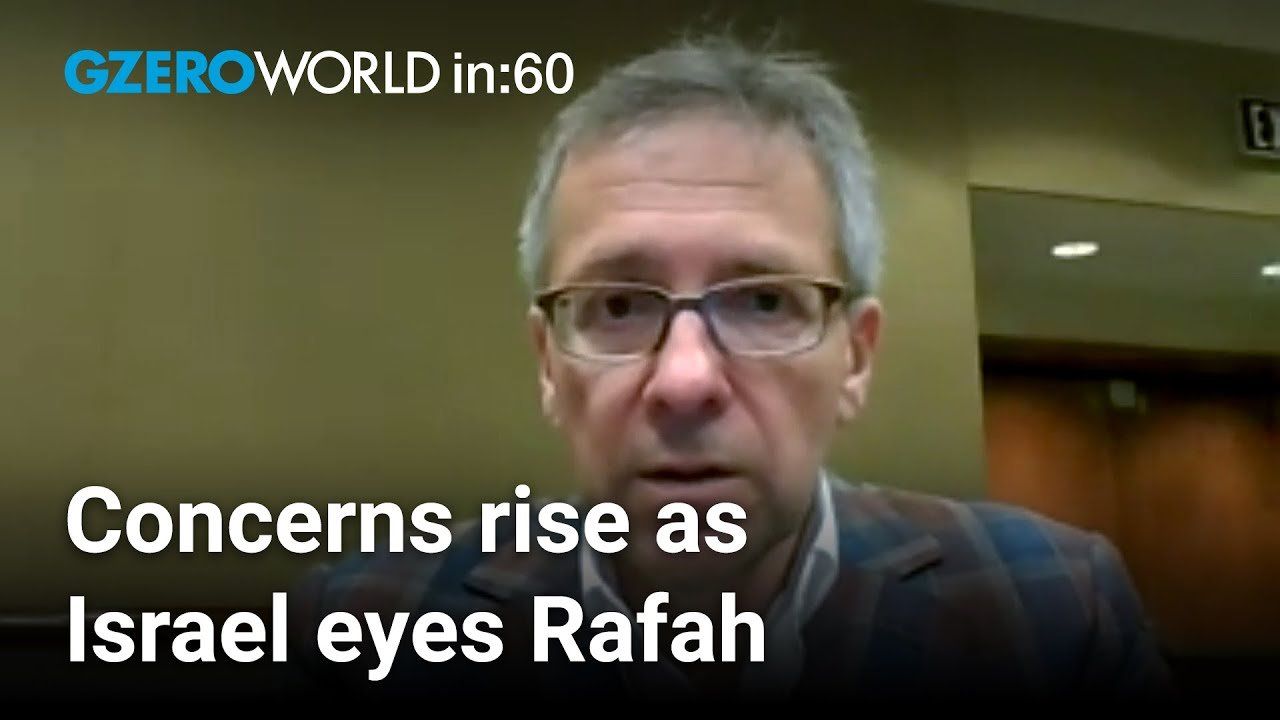Ian Bremmer shares his insights on global politics this week on World In :60.
How will the international community respond to an Israeli invasion of Rafah?
Very, very badly. You see that the Israeli prime minister and War Cabinet continues to say that no matter what happens with the hostages and a potential deal, and everyone's trying to get one done at the last minute, that the intention is still very much to fight on the ground there. I don't think that's a bluff. And especially because it's supported by the entire Israeli political spectrum and the population, they believe that you've got to take out Hamas. And beyond that, there's also the concern about Hezbollah. So I think the international response is going to be very negative. It is certainly going to push back the possibility of any Saudi normalization, and it's going to lead to a lot more demonstrations and hostility against Israel in the United States and in Europe.
How would a Trump presidency be different from his first term?
I think the biggest issue, is that, Trump is going to be focused much more on ending, all of these cases against him, which he sees as completely unjust and that the political enemies, need to be responded to. And that means a top priority of ensuring that the leadership of the Department of Justice, the FBI, probably the IRS, are political appointees and loyalists to him. This was not a priority in the first administration. There's no Bill Barr coming back as attorney general. And I think the potential of that, to both create a new McCarthyism in the United States and also to create a structural advantage for the incumbent party in being able to ensure election outcomes much more strongly than you would in a normal, representative democracy, that is significantly at risk in that environment. That'll change the way we think about rule of law in the United States. That's probably the biggest difference.
Are growing US campus protests a sign of a chaotic election in November?
I wouldn't say that yet. We're still talking about relatively small numbers of students, and after graduations are over, I think the student protests are over. But there's no question this does reflect a significant anger among young people in the country. A lot of the people that are involved in the takeovers of buildings, for example, and the tussling with police, are not the students themselves, but people coming in, political entrepreneurs, if I can call them that, from outside. I am deeply concerned about what happens with the upcoming Democratic convention in Chicago. I think that could be very violent with lots of demonstrations. Certainly I don't see the war in Gaza over any time soon. And as a consequence of that, I think that, this is going to be a big problem and very, very challenging, as we think about the most dysfunctional and polarized US election since the 19th century, since the period of reconstruction.
- Crisis at Columbia: Protests and arrests bring chaos to campus ›
- Biden vs Trump foreign policy: Political scientist Stephen Walt weighs in ›
- Trump continues to lead the GOP charge ›
- Israel’s Shifa raid ends. Is Rafah next? ›
- What will Israel's invasion of Rafah look like? ›
- Israel-Hamas war: Who is responsible for Gaza's enormous civilian death toll? - GZERO Media ›
More For You
Most Popular
Will AI change the balance of power in the world? At the 2026 World Economic Forum in Davos, Ian Bremmer addresses how artificial intelligence could redefine global politics, human behavior, and societal stability.
Ian Bremmer sits down with Finland’s President Alexander Stubb and the IMF’s Kristalina Georgieva on the sidelines of the World Economic Forum to discuss President Trump’s Greenland threats, the state of the global economy, and the future of the transatlantic relationship.
GZERO World heads to the World Economic Forum in Davos, where Ian Bremmer lookst at how President Trump’s second term is rattling Europe, reshaping both transatlantic relations and the global economy, with Finland’s President Alexander Stubb and the IMF’s Kristalina Georgieva.
